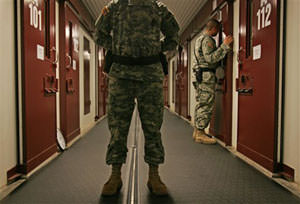A Government of Law, Not Fear
John McCain and Barack Obama's differences over the Supreme Court's recent Guantanamo decision speak volumes about the two candidates and their competing visions for America.
The Constitution holds, albeit by a slender thread. The Supreme Court, by a 5-4 vote in Boumediene v. Bush, ruled unconstitutional a 2006 law barring enemy combatants held at Guantanamo from seeking writs of habeas corpus. For now, we are not under Chief Justice John Roberts’ or Justice Antonin Scalia’s constitution. Fear reigns in their dissent amid Cassandra-like threats that we are doomed unless we scrap our constitutional protections for the duration of that never-ending and nebulous “war on terror.”
Perhaps we will have a bit of relief from President George W. Bush’s fear-mongering, which has run through our political bloodstream for the past seven years.
Justice Anthony Kennedy categorically rejected the Bush administration’s defenses, saying they failed to offer “the fundamental procedural protections of habeas corpus.” In words and ideas similar to those of Oliver Wendell Holmes and Louis Brandeis, Kennedy asserted that “the laws and Constitution are designed to survive, and remain in force in extraordinary times.” Scalia lamented that the ruling would “almost certainly cause more Americans to get killed,” and he added: “The nation will live to regret what the court has done today.” Ironically, the justice who helped to override precedent and principle by handing George Bush the disputed election of 2000 railed against “judicial supremacy.”
The decision is most welcome, but also welcome is that a presidential candidate bluntly and eloquently has endorsed it and the principle of habeas corpus. No, not “Straight Talking” John McCain, who predictably pandered to his right-wing chorus and denounced the decision. “The United States Supreme Court yesterday rendered a decision which I think is one of the worst decisions in the history of this country,” former prisoner of war McCain said. He quoted red-meat sound bites from the chief justice’s dissent, and attacked “unaccountable judges” who would allow detainees to “flood” the courts.
The other candidate, Barack Obama, the former constitutional law teacher, knows his stuff, saying that the “state can’t just hold you for any reason without charging you and without giving you any kind of due process.” That, he flatly said, is “the essence of who we are.”
And the presumptive Democratic nominee had a little bit more history for his audience in Wayne, Pa.: “I mean, you remember during the Nuremberg trials, part of what made us different was even after these Nazis had performed atrocities that no one had ever seen before, we still gave them a day in court. And that taught the entire world about who we are but also the basic principles of rule of law. Now the Supreme Court upheld that principle yesterday.”
He took nothing back in a more carefully prepared statement for his Web site. He praised the court’s protection of “our core values,” and noted it had rejected the Bush administration’s attempt to create a “legal black hole” in Guantanamo — a policy already endorsed by McCain. The Illinois senator boldly rejected Bush’s reliance on a false choice between fighting terrorism and respecting our concepts of rule of law. Bush’s policy has yet to secure a conviction resulting from any terrorist act in the past seven years. We should remember that our legal system coped fairly and efficiently, entirely within the parameters of our rule of law, to gain convictions of the World Trade Center bombing perpetrators of 1993.
Obama voted against the Military Commissions Act two years ago. That law, which the Boumediene case overturned, was passed by a supine Congress, terrorized and at the mercy of Bush’s weapons of mass fear. Obama’s vote is a preface to his ringing endorsement of the Boumediene ruling. He has turned the administration’s position on its head, challenging Bush’s policy as “not tough on terrorism, and it undermines the very values that we are fighting to defend.”
It would be foolhardy to predict that the court will now reinvigorate the panoply of civil liberties so twisted in the past seven years. At best, the Boumediene ruling offers a faint glimmer of hope. With the proper cases, the justices might decide to correct other constitutional travesties, such as torture, rendition and warrantless wiretaps. We can applaud the court’s majority and a scholarly presidential candidate who spoke so eloquently and affirmatively in defense of our “core values.” A rare political moment for our times.
Sen. Lindsey Graham, McCain’s close ally and sometime spokesman, has called for a constitutional amendment to keep the Supreme Court from conducting war. Ridiculous, if not ludicrous. What posturing! Meanwhile, right-wing blogs have marched in lock step, calling for McCain to make this one of his causes. Fine.
For now, the Supreme Court — well, at least a majority of it — has reminded us we have a government of laws, not men. And maybe this time, when we get around to debates or town meetings, perhaps Sens. McCain and Obama will engage each other — and us — on these vital matters of who and what we are. That would be nothing less than audacious.
Stanley Kutler is the author of “Abuse of Power: The New Nixon Tapes” and numerous other writings on American constitutional law and the presidency.
Your support matters…Independent journalism is under threat and overshadowed by heavily funded mainstream media.
You can help level the playing field. Become a member.
Your tax-deductible contribution keeps us digging beneath the headlines to give you thought-provoking, investigative reporting and analysis that unearths what's really happening- without compromise.
Give today to support our courageous, independent journalists.






You need to be a supporter to comment.
There are currently no responses to this article.
Be the first to respond.